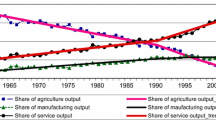Abstract
Major changes have occurred in the structure of former centrally planned economies, including a sharp rise in the share of services in GDP, employment, and international transactions. However, large differences exist across transition economies with respect to services intensity and services policy reforms. We find that reforms in policies toward financial and infrastructure services, including telecommunications, power, and transport, are highly correlated with inward FDI. Controlling for regressors commonly used in the growth literature, we find that measures of services policy reform are statistically significant explanatory variables for the post-1990 economic performance of transition economies. These findings suggest services policies should be considered more generally in empirical analyses of economic growth.
Similar content being viewed by others
References
Baumol, W. (1967). Macroeconomics of Unbalanced Growth. American Economic Review 57(3): 415–426.
Bićanić, I., and M. Škreb (1991). The Service Sector in East European Economies: What Role Can It Play in Future Development. Communist Economies and Economic Transformation 3 (1): 221–233.
Campos, N., and F. Coricelli (2002). Growth in Transition: What We Know, What We Don’t, and What We Should. Journal of Economic Literature 40 (3): 793–836.
EBRD (European Bank for Reconstruction and Development) (2004). Transition Report 2004. London: EBRD.
Eschenbach, F. (2006). Reform of Services Policy and Commitments in Trade Agreements. In S. Evenett and B. Hoekman (eds.), Economic Development and Multilateral Cooperation. London: Palgrave-MacMillan and World Bank.
Falcetti, E., M. Raiser, and P. Sanfey (2002). Defying the Odds: Initial Conditions, Reforms, and Growth in the First Decade of Transition. Journal of Comparative Economics 30 (2): 229–250.
Francois, J. F. (1990). Producer Services, Scale, and the Division of Labor. Oxford Economic Papers 42 (4): 715–729.
Francois, J. F., and K. Reinert (1996). The Role of Services in the Structure of Production and Trade: Stylized Facts from a Cross-Country Analysis. Asia-Pacific Economic Review 2 (1): 35–43.
Fuchs, V. (1968). The Service Economy. New York: Columbia University Press.
Konan, D., and K. Maskus (2006). Quantifying the Impact of Services Liberalization in a Developing Country. Journal of Development Economics 81 (1): 142–162.
Levine, R., and D. Renelt (1992). A Sensitivity Analysis of Cross-Country Growth Regressions. American Economic Review 82 (4): 942–963.
Levine, R. (1997). Financial Development and Economic Growth: Views and Agenda. Journal of Economic Literature 35 (2): 688–726.
Lucas, R. E. Jr. (1988). On the Mechanics of Economic Development. Journal of Monetary Economics 22 (1): 3–42.
Markusen, J., T. Rutherford, and D. Tarr (2005). Trade and Direct Investment in Producer Services and the Domestic Market for Expertise. Canadian Journal of Economic 38 (3): 758–777.
Mattoo, A., R. Rathindran, and A. Subramanian (2006). Measuring Services Trade Liberalization and Its Impact on Economic Growth: An Illustration. Journal of Economic Integration 21 (1): 64–98.
Roland, G. (2000). Transition and Economics: Politics, Markets and Firms. Cambridge, Mass.: MIT Press.
Romer, Paul M. (1990). Endogenous Technological Change. Journal of Political Economy 98 (5): 71–102.
World Bank. (2005). From Disintegration to Reintegration:Eastern Europe and the Former Soviet Union in International Trade. Washington, D.C.: World Bank.
Author information
Authors and Affiliations
Corresponding author
Additional information
JEL no.
F14, F43, O14, O40
About this article
Cite this article
Eschenbach, F., Hoekman, B. Services Policy Reform and Economic Growth in Transition Economies. Rev. World Econ. 142, 746–764 (2006). https://doi.org/10.1007/s10290-006-0091-7
Issue Date:
DOI: https://doi.org/10.1007/s10290-006-0091-7




